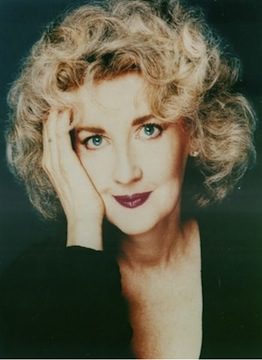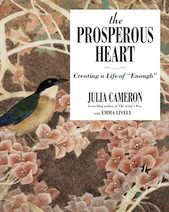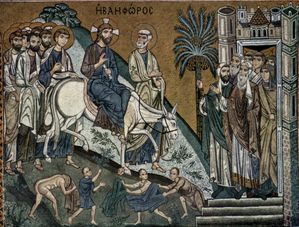 Six years ago, when I was climbing out of my severe depression, I read Julia Cameron’s bestselling book, “The Artist’s Way.” It helped me move from a place of insecurity to one of courageous creativity — laying out my innermost thoughts unto a new blog I started writing called “Beyond Blue.” So when I received Cameron’s latest book, “The Prosperous Heart,” I was intrigued and started to read. She attempts to address the practical side of the creative life. To be honest, I’m not sure she succeeds. But that could be my jaded disposition at the moment. Back when I was making good money writing (before the publishing industry fell into the toilet), creativity produced income and was both fun and practical. Now it is a luxury, and one that stresses me out a lot of the time. It’s difficult to move from a press release about Semantic Web technology into a reflection on my spiritual journey. At any rate, I do think a creative outlet is a helpful tool in keeping a resilient spirit. So may you find wisdom with this book! Here is a short interview with the author.
Six years ago, when I was climbing out of my severe depression, I read Julia Cameron’s bestselling book, “The Artist’s Way.” It helped me move from a place of insecurity to one of courageous creativity — laying out my innermost thoughts unto a new blog I started writing called “Beyond Blue.” So when I received Cameron’s latest book, “The Prosperous Heart,” I was intrigued and started to read. She attempts to address the practical side of the creative life. To be honest, I’m not sure she succeeds. But that could be my jaded disposition at the moment. Back when I was making good money writing (before the publishing industry fell into the toilet), creativity produced income and was both fun and practical. Now it is a luxury, and one that stresses me out a lot of the time. It’s difficult to move from a press release about Semantic Web technology into a reflection on my spiritual journey. At any rate, I do think a creative outlet is a helpful tool in keeping a resilient spirit. So may you find wisdom with this book! Here is a short interview with the author.
Your books, lectures, and workshops have founded a movement that has enabled millions to realize their creative dreams. How does The Prosperous Heart address the practical side of living a creative life?
When I teach, I consistently find that the most “loaded” topic for my students is money. I wanted to write a book that would give my students the tools to address their money issues directly while maintaining spiritual balance and an active creative life.
Creating a life of “enough” is one of the main themes of The Artist’s Way. What does “enough” mean?
So much of our mythology around money centers on the illusion that if we had “more,” we would be more comfortable and more able to access our creativity. But creativity and prosperity are spiritual matters, not fiscal ones. The tools of The Prosperous Heart help people to embrace the life that they actually have, where they often find that they already have “enough.”
In this difficult day and time, what can people do to find prosperity?
There are two very practical tools used by my students. The first one is Morning Pages, where they track their dreams, their disappointments, dreams and desires. The second tool is Counting, where they record money in and money out. We often find we are spending money in ways that do not serve us. As we work with these two consciousness-raising tools, we find ourselves spending along the lines of our true values. As a result, we feel we have “more.” We certainly have enough.
Did you set out to create a prosperity plan for yourself?
Yes. I have a personal prosperity plan. I know where my money goes, and how I can spend it more fruitfully. A prosperity plan is something fluid that may alter month to month.
Do you feel clutter plays a role in blocking creativity and prosperity?
Yes, absolutely. When we clear the physical clutter from our lives, we literally make way for inspiration and “good, orderly direction” to enter.
As a novelist, playwright, songwriter, journalist, teacher, and poet, what are your favorite artistic venues?
I have to say that my favorite venue is whatever venue I’m working on at the time. Right now I’m working on a sequel to my novel, Mozart’s Ghost.
Photo credit Aloma.

